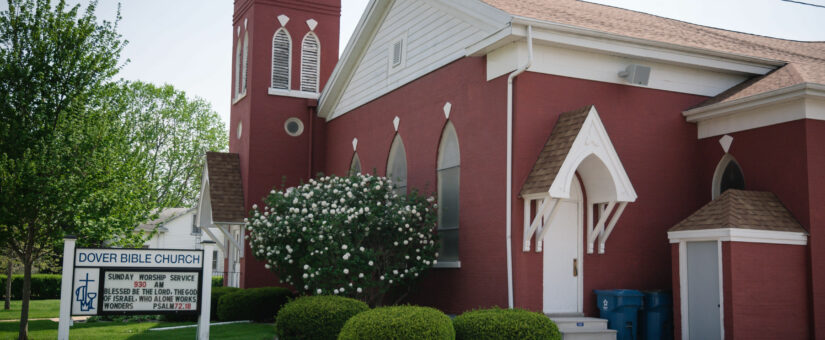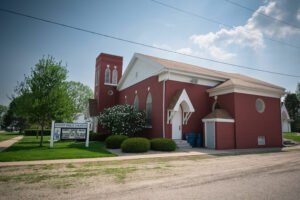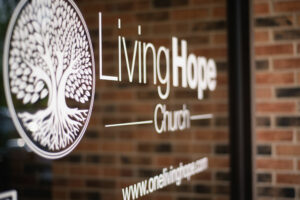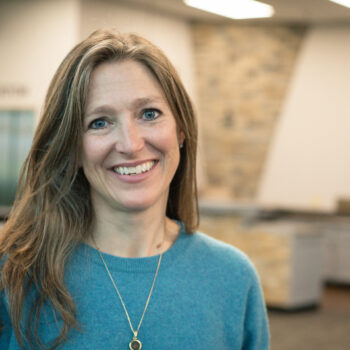
When Company in Conflict Brings Healing from Hurt
- Posted by Babs Mullinax
- On June 22, 2022
- 0 Comments
- Alliance Midwest District, Alliance Peacemaking, conflict in churches, Dover Bible Church, Living Hope, Nigel Probert, transitional pastor
One church, Dover Bible Church, is housed in their own building, tucked between farm fields in a town you have to click pretty closely on Google maps to even find, is mostly attended by older white folk, and is currently without a pastor and being led by the elder board (among a variety of other committees). The other church, Living Hope, borrows meeting space in the suburbs of Chicago, is filled with young families (mostly second generation Asian Indian), administered from an off-site office suite, and led by two pastors and an elder board. Could the two be more different?
And then enter a 6’7” Welsh man and his wife from Montana, Nigel and Pauline Probert.
The two churches have found each other through Nigel and formed an instant bond because they really do have so much in common.
So, what is the story? It may sound more familiar to you than you may initially suspect. The common ingredients are transition, loss and grief, passions, calling, learning curves, expectations, humility, and heartbeats for the local church and its people. Toss these together and you could find a side of assumptions and misunderstandings, which can lead to conflict – which is never the goal of any church or leadership team; but it often happens. That’s what these two churches had in common, specifically stemming from the loss of leadership. Take away the differentials and you find two churches that were both in need of development and healing – which is exactly what Jesus offers us!
Nigel Probert is part of a unique group of seasoned pastors serving the Alliance family with intentionality through the Alliance Transitional Pastor Network (ATPN) and he is passionately involved with Alliance Peacemaking, which endeavors to train people in a rather sanctifying biblical approach to conflict – 80% of the process is between you and God, before even addressing the other parties in the conflict. Add to the mix Nigel’s lyrical Welsh accent and exceedingly kind heart; he became the healing balm that these churches needed.

Dover Bible Church was first to receive Nigel and Pauline, by way of introduction from former Midwest District Superintendent, Jon Rich and later endorsement by current District Superintendent, Bob Petty. They were at a point of desperation in how they led the church in absence of a pastor. As they neared the end of one year with the Proberts, Living Hope was poised to receive them next. “God was already ahead of us in what we were searching for in the aftermath of a drastic leadership transition,” says Jimi Vilson, co-pastor of Living Hope. “’A unicorn,’ Kurt Sovine described it! Someone who could develop existing leadership and bring healing to the church.” Having recently heard Nigel’s story and his heart for the church, Kurt encouraged Living Hope to invite the Proberts up for an introductory meeting. Mabel Philip, Communications Coordinator at Living Hope, said, “We heard he liked Indian food, so we invited him to a feast!”
And yet, there was hesitation. Jiju Mathew, the other co-pastor at Living Hope, even wrote a formal protest to the elders against the idea of bringing a transitional pastor. He was open to the idea of coaching for development, but a pastor? “I didn’t know if our core values would be lost or compromised if another pastor came on board. The elders felt strongly that we needed a pastor to fit into the life of the church – to see beyond the leadership into the people of the church (even those who had left).”

As the first meeting with Nigel progressed, Jimi and Jiju were “googly eyed” with Nigel as he frequently pulled out the Word and supplemented conversation with prayer as naturally as he was breathing. Despite the ensuing struggle amidst loss and grief, the pastors and elders were united in moving forward with inviting Nigel into the fray.
A Zoom call was arranged between the leadership of the two churches to see if this really was a good fit for Living Hope. Does he really do what he says he does? Surely they were in different circumstances! Afterall, the two churches were so different from one another! At the end of the Zoom call, however, Dover Bible Church was encouraged that they weren’t the only ones in need of healing. There is an isolating temptation to believe you’re the only broken church out there. The elders at Dover Bible Church said, “We hunker down in the cornfield and don’t really think about other churches. We’re just back at it come Monday.” Living Hope found a hope that there was a ministry out there that could bring them out of a stall and start anew. Their hearts were knit together. In fact, Mabel echoed a similar sentiment to Dover’s, “It’s so easy to feel like there is something wrong with us. We’re learning that healing takes time, but there can still be healing and growing forward. God uses broken people in his story to accomplish his will.”
“We are a family,” says Nigel. “When one hurts, we all hurt, and we recognize it. When we hear a similarity, we don’t commiserate with each other; rather it generates hope!” In fact, the relationship between Dover Bible Church and Living Hope has only begun. The transition team at Dover Bible Church has hopes for road trips to visit each other and shared ministry opportunities!
What did they find in common? Each church had a pastor and elders transition out. That results in a loss that you may not realize you need to grieve – it’s a loss of people (because usually when a pastor transitions out, so do a number of people from your congregation), which leads to a loss of fellowship and friendships. Nigel explains, “It’s a terrible kind of grief, because the person is still alive and close by; just painfully absent.” Each grief situation is singularly individual, but there are common threads. In grief and loss a congregation can find itself floundering, broken, discouraged, and at a loss of hope, which breeds conflict. “Conflict is dividing,” Nigel explains, “and communication gets lost in the way. There are all sorts of feelings involved in this, the strongest of which is shame,” Nigel observes.
Biblically, Nigel recalls the beginning of Nehemiah, when men from Jerusalem visit Nehemiah in the citadel of Susa:
They said to me, “Those who survived the exile and are back in the province are in great trouble and disgrace. The wall of Jerusalem is broken down, and its gates have been burned with fire.” When I heard these things, I sat down and wept. For some days I mourned and fasted and prayed before the God of heaven.
Nehemiah 1:3-4
Soon you find the church has lost their first love in the struggle to survive the conflict. “That’s where I see my job is: to get each church back to their first love. Because, man! These people are gifted! There’s just brokenness among them…”
Finding Your Way Back
How? Nigel starts with four biblically saturated principles, the most important of which is the first:
Godly Sorrow
The pastors and leaders need to be brought to a true godly sorrow (2 Corinthians 7) to restore their heart to one that is broken for the church. “Nehemiah prayed and fasted for four months,” Nigel emphasizes. “This is key! True godly sorrow leads to repentance and salvation, while worldly sorrow is trapped in regret and embarrassment, which only leads to death.”
Bring Reconciliation to the Past
The transition team at Dover Bible Church testified to this. “Nigel had a way of arranging meetings with people we had lost from the church and kindly-but-firmly insisting that we show up. Nigel wasn’t dictatorial, but he arranged things and facilitated opportunities to communicate. He had a way of getting us out of our comfort zone and addressing the elephant in the closet.” Author’s note: The elephant wasn’t even in the middle of the room – it had been shoved and stowed into a closet! Nehemiah’s prayer in verses 5-11 outlines this beautifully:
Lord, the God of heaven, the great and awesome God, who keeps his covenant of love with those who love him and keep his commandments, let your ear be attentive and your eyes open to hear the prayer your servant is praying before you day and night for your servants, the people of Israel. I confess the sins we Israelites, including myself and my father’s family, have committed against you. We have acted very wickedly toward you. We have not obeyed the commands, decrees and laws you gave your servant Moses.
Remember the instruction you gave your servant Moses, saying, “If you are unfaithful, I will scatter you among the nations, but if you return to me and obey my commands, then even if your exiled people are at the farthest horizon, I will gather them from there and bring them to the place I have chosen as a dwelling for my Name.”
They are your servants and your people, whom you redeemed by your great strength and your mighty hand. Lord, let your ear be attentive to the prayer of this your servant and to the prayer of your servants who delight in revering your name. Give your servant success today by granting him favor in the presence of this man.
In doing that, Nigel won’t leave any stone unturned to bring healing and restoration to relationships. Don Elmore, an elder at Dover Bible Church, says it was worth it. “Our church has grown to be a family – stronger than before the Proberts came. Not in numbers yet, but spiritually. Those who left may not have returned, but we are no longer enemies.” Jiju, at Living Hope, expressed something remarkably similar, “I have more confidence in approaching difficult conversations. Nigel has taught me how to go and listen to the other hurting person from my brother’s perspective. Learning how to listen and process and enter into those spaces has shown me how prideful and I am and how insular in my hurt I have been in my life.” At the end of the conversation, Jiju also said, “God has a heart for our church, yes; but he also has a heart for those who have left our church. They are not absent in that!”
Here are some of Nigel’s tips:
- Pursue communion, which involves examining yourself. As leadership, you also examine the church body (1 Corinthians 11:28).
- Get past “right vs. wrong” and see what might be corrupting you. Get the log out of your own eye (Matthew 7:5)!
- Don’t try to build a house where the foundation is crumbling in one corner. It must be dug up and reset. Quit patching it up and wondering why it’s crumbling!
Bring Healing to the Present
There is a point when reconciling the past is over and you intentionally move into the present. Nigel recalls Larry Thorson, recently retired from Hope Community Church in Cottage Grove, Minnesota, saying “If you have anything to share about the past, please let me know because next Sunday we start looking forward. There’ll be no more looking back.” Nigel also summarizes a portion of Kenneth Quick’s book, Healing the Heart of the Church, “We dealt with the past, we fixed what we could, and now we move forward just like we would with ourselves. A lot of people don’t come back to the church, but they were lovingly listened to. And now… We delve into what the church values.”
Therefore, since through God’s mercy we have this ministry, we do not lose heart. Rather, we have renounced secret and shameful ways; we do not use deception, nor do we distort the word of God. On the contrary, by setting forth the truth plainly we commend ourselves to everyone’s conscience in the sight of God
2 Corinthians 4:1-2
Here are some of Nigel’s tips:
- Ask yourself individually, then corporately: Do you want the church to look like you: your devotional life, your thought life, your relationship with Christ, and your relationship with others?
- Do you want the church to look like you as a group (the leadership team): openness, ability to confess to one another, to be a team?
“There is a truth in Hosea 4:9,” Nigel teaches, “that the people will look like the priests. The church will always reflect its leadership, so this is where we begin. We start with ourselves and then the church will follow.”
Come Together and Prepare
Providing housing for the Proberts was a simple but significant action step in this. It put skin in the game, so to speak, for the churches. Dover Bible Church furnished their parsonage to adequately supply the needs of the Proberts, and Living Hope provided a furnished apartment for them. Not only was this the Proberts’ first apartment-living experience, but this was also Living Hope’s first experience to provide a parsonage. “God really provided through his people,” observes Mabel.
We have spoken freely to you, Corinthians, and opened wide our hearts to you. We are not withholding our affection from you, but you are withholding yours from us. As a fair exchange—I speak as to my children—open wide your hearts also.
2 Corinthians 6:11-13
A greater part in this principle is drawing people out, calling out the gifts in everybody, and seeing and empowering the quiet people. Dover Bible Church assured Living Hope that the Proberts very quickly get into the life of the church and are deeply loved by all because of this approach to the church body, and Jiju agrees. “After only two months, God has done some incredible things! Nigel has a posture of leaning in (and I mean physically as well, which is impressive given his height) to listen to every single person’s story and acknowledge the hurt and pain in everyone’s story. He is always asking, ‘What can the Lord do through each and every person?’” Jimi agrees, “He encourages the crap out of anyone with an intense sincerity. He reinforces to everyone, ’You are an image bearer of Christ’ in a way we can’t not believe it about ourselves and each other. He gives us a feeling that God is doing something… We just don’t know what yet.”
Don insists on being quoted on this point, “Nigel is the most human pastor I have ever met – his strength, his compassion, his humility in asking for help.”
Dover Bible Church describes Nigel and Pauline as people with a gift to fit in and fill in wherever they are. The lessons they were left with were:
- That we’re all (the church) involved somehow with each other. It gives us a sense of purpose for the church.
- There’s more than one perspective to every story. Nobody is 100% right or wrong.
- We value each other as children of Christ.
- When speaking, be 100% truthful and 100% respectful.
- We have had strengths and gifts called out in us and the mentorship to navigate them.
Vunerability
Throughout this whole process, the key ingredient is vulnerability. Mabel summarized it, “Vulnerability begets vulnerability.”
Vulnerability was required for Nigel when he insisted that Living Hope reach out to Dover Bible Church as a reference to see if he was a viable fit. He had to trust the Lord with his own reputation when the churches started talking to one another. It gave him a sense of affirmation and accountability for his ministry.
Vulnerability was required for Dover to admit they couldn’t pull it off on their own.
Vulnerability was required for Living Hope to submit to a development process for their two existing pastors by bringing on another pastor. Jimi still admits that it doesn’t make worldly sense, “We already have two quarterbacks,” referring to him and Jiju as co-pastors. “The Lord had to convince me. I still struggled, but I submitted. After meeting Nigel and talking with the team at Dover Bible Church I decided I just needed to get out of the way and let the Lord move. The ratios don’t make sense – the budget, the congregation size… But I had to go back to why we needed Nigel and move my pride out of the way. I’m benefiting from a mentorship that comes with journey stories (of an experienced pastor). The Lord is so generous to us, even if on paper we don’t need it.”
Sound Familiar?
Does your story have these common ingredients of transition, loss and grief, passions, calling, learning curves, expectations, humility, and heartbeats for the local church and its people? Be released from the shame and embarrassment of not having it worked out already. Jesus also offers you healing and growth.
“We are a family,” we’re reminded by Nigel. “When one hurts, we all hurt, and we recognize it. When we hear a similarity, we don’t commiserate with each other; rather it generates hope!”
Hope is prevalent in this story! God is moving as churches and leaders are finding freedom in healing from hurt and loss and confusion.
“We are family,” emphasizes Bob Petty, our District Superintendent, whose heart is undoubtedly for the growth and empowerment of our churches. “And we are here to help.” If this story sounds like your story and you’re reaching for hope, contact Bob Petty or Marshall Mullinax at the district office.



